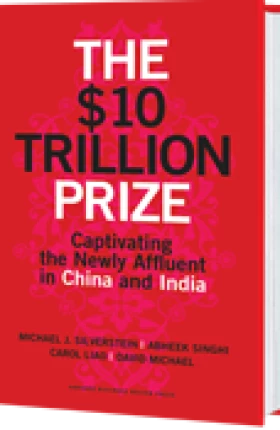When it comes to China and India, we at The Boston Consulting Group urge you to bet in favor of both.
Just yesterday, the Organization for Economic Cooperation and Development (OECD) released a new report predicting that the economy of China will rebound and grow 8.5 percent in 2013 and 8.9 percent in 2014, citing increasing domestic consumer demand and government spending on housing and infrastructure as the tailwinds behind this renewed surge. According to The Wall Street Journal, the OECD report attributed China's slightly less robust 7.5 percent growth rate this year to a slowdown in exports and the government's intervention to stave off inflation and rein in property prices. The OECD report also expressed optimism that India's economy will resume growth over the next two years, indicating that its currency will likely be shored up soon and that its current-account deficit issues will be stabilized, too.
Given recent blips in both countries’ economies, many prognosticators have sounded dire alarms, urging caution for Western companies pondering their future initiatives in China or India. In our new book, The $10 Trillion Prize: Captivating the Newly Affluent in China and India , we posit that growth in China and India will not occur along a straight line, and both countries will have to overcome corruption, imprudent investments, social disharmony, pollution, natural disasters, and political conflict. But our book’s primary thesis—and one that we continue to maintain—is that the economies of China and India will continue to grow at a compound annual growth rate of at least 8 percent through the end of the decade, and that annual consumer spending in the two countries combined will therefore reach $10 trillion by 2020.
As we ponder the next decade, we believe that the ambition, energy, and relentlessly optimistic mindset of the billion newly affluent Chinese and Indians will prevail. Our book offers a manifesto for growth and wealth creation. We have spent enough time in enough Chinese and Indian living rooms to understand the middle-class population’s needs and desires. They will become increasingly intolerant of corruption, pollution, and lawlessness. They will buy brand-name goods and increase their own investment in their family, home, health, and education. They will use the power of the purse to carve out a world that meets their hopes and dreams. (See our short video featuring this “$10 Trillion Prize.”)
As we reported in our book, in China, annual per-capita income is projected to rise, on average, from about $4,400 in 2010 to $12,300 in 2020; in India, it will increase from $1,500 to $4,400. China’s upper-income bracket will nearly quadruple, from 24 million to 91 million households; its middle class will grow from 109 million to 202 million households. India’s upper-income bracket will increase from about 9 million to 32 million households and its middle class from 63 million to 117 million households. Given these income trends, and longer life expectancies, we estimate that Chinese children born in 2009 will likely consume approximately 38 times more than their grandparents during their lives; Indian babies will consume 13 times more than their forbearers.
Specifically, we have calculated that between 2010 and 2020, the people of China and India will consume some $64 trillion in goods and services. Chinese consumers will spend approximately $41.5 trillion, with annual expenditures increasing from $2 trillion in 2010 to more than $6 trillion in 2020. Indians will spend $22.5 trillion, with annual spending rising from $991 million to $3.6 trillion. Combined, they will be spending some $10 trillion per year by 2020—more than three times what they’re spending today. But this consumer-driven growth is only the first burst of historic economic energy. It will also lead to enormous global-infrastructure projects, mostly involving roads, telecom, power, airports, water, health care, and educational institutions. It will drive the rise of powerful, capital-rich companies in China and India, many with official and unofficial state backing.
We would urge you to keep faith and press forward in both China and India. Sure, forecasts presume stability and can be knocked off course by economic downturns, natural disasters, political unrest, and unchecked corruption. But as we show in our book, Chinese and Indian entrepreneurs and executives understand precisely what’s happening. They have witnessed tremendous new government investments in infrastructure; they see booming cities; they see hundreds of millions of new middle-class consumers ready and eager to spend. Some confidently predict that their businesses could grow by a factor of ten in the next ten years. We believe Western companies could—and should—be growing with them. The $10 Trillion Prize is real, and it’s yours for the taking.






